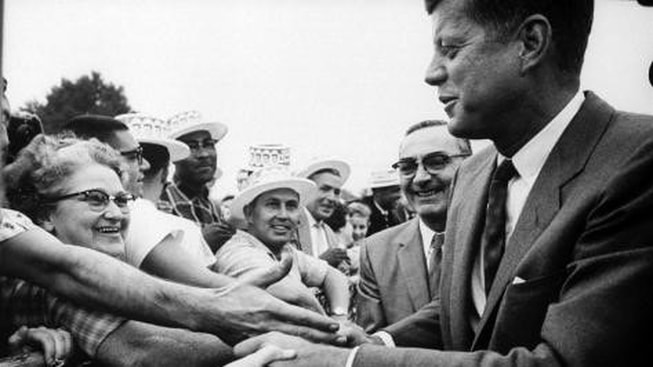|
Before the appearance of Jack Kennedy as a television celebrity about 1960, Americans did not feel any personal relationship with Presidents. In the early days they were men of accomplishment who received respect as their due. After that occasionally they were military heroes, but until about 1960 they were mostly hack politicians, like nearly all the Republican nominees for President. FDR, of course, was loved by many people for his cheerful uplift in hard times. But the public did not really know him and expect to invite him for supper. Since, 1960, when television damaged Nixon with his “three o’clock shadow,” personal identification with the candidate or the lack thereof has been an important but little recognised factor in Presidential elections. A large number of Americans want to feel like they know the President as a friend, someone they would like and who would like them if they were personally acquainted. A lot of Republicans even referred to the unlovable Nixon as “my President”--- shortly before they deserted him. Such people stupidly like to believe or at least to pretend that we Americans are really just all one big happy family. The champion in this respect was Reagan. He was the ideal avuncular and benevolent fellow, always unruffled and ready with a joke. You would be happy to see him at the Thanksgiving table and he would never forget your birthday. The next best in the likable friend category was Obama. Here was a guy who was only half black and cool. You could have him as a neighbour and feel virtuous without running any risk of a mugging. To a degree that is probably not sufficiently recognized, Bill Clinton was favoured by the likable friend factor also. He seemed easy-going and reasonable, not likely to do anything too crazy that would cause you trouble personally. Most Americans don’t have the experience of politics or insight to detect a plausible psychopath beneath the friendly demeanour. Unlike Carter, whose Southern accent was too pronounced and was too earnest, demanding that you really do some unpleasant thinking about things. Unlovable Nixon lucked out. While nobody could really like him, at least as he appeared in the media, he had as opponents Humphrey and McGovern, the pretentious hectoring know-it-all college professor that you did not like. At least Nixon seemed experienced and relatively sane. Americans do not like spoiled smart-aleck rich boys. Adlai Stevenson never had the faintest chance against Eisenhower. However, Bush minor lucked out even more than Nixon. Nobody really liked the brat very much, but he was up against Gore, who was not only a spoiled brat but a pompous flake. And nobody could really warm up to Kerry (or the other Massachusetts Yankees, Dukakis earlier and Romney later). For some, Trump is the hard-driving ambitious fellow in your high school class who was fun to watch. Half of the class admired him and half hated him. Most of the public continue to like Hillary because they take her as a woman of accomplishment. That she has never done anything admirable and is vicious off-camera is something the public is not sharp or cynical enough to notice. If they really knew her personally they would recognise her as the nasty women she is. The election of 2016 was a classic contest between the jocks and the nerds. Of course, we have to allow that Trump is the first nominee of either party who has had anything to say about any real issues in a long time. The nerds are increasingly outnumbering the jocks, which is a sign that people are feeling a false sense of security. If my little analysis is right, then the person to watch for 2020 is Warren. Despite all her swerving, she comes across as the ideal Yankee well-meaning schoolmarm, an image that I wager still has a lot of power.
1 Comment
|
AuthorClyde Wilson is a distinguished Professor Emeritus of History at the University of South Carolina He is the author or editor of over thirty books and published over 600 articles, essays and reviews Archives
July 2024
|

